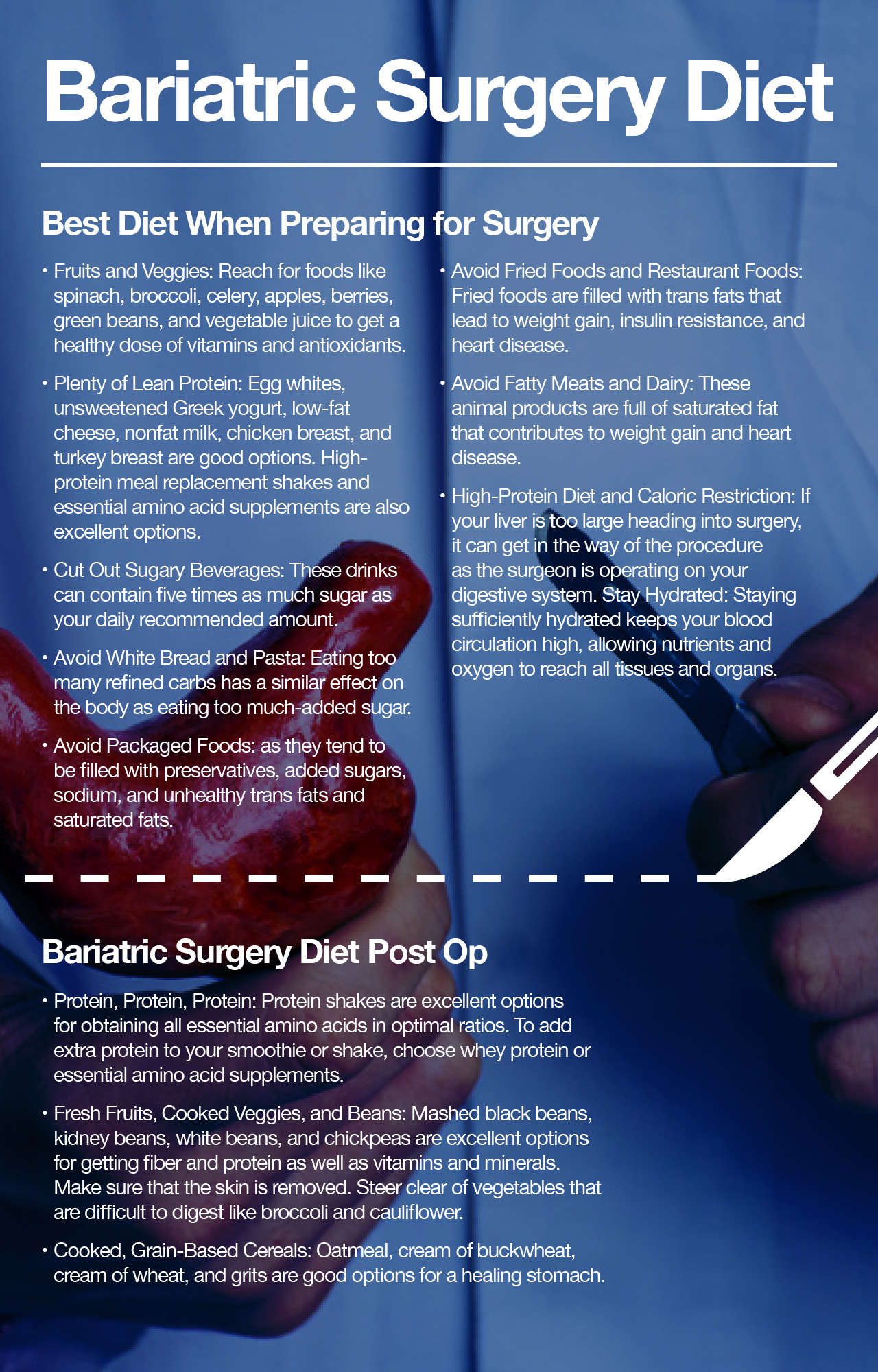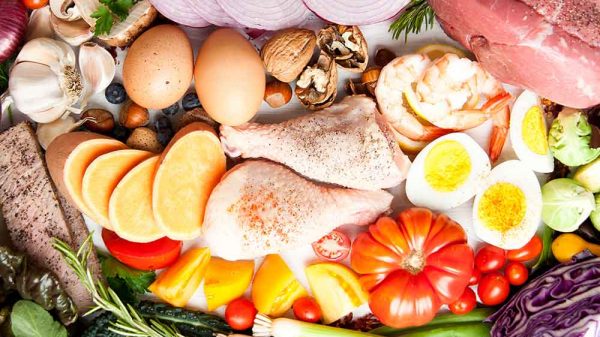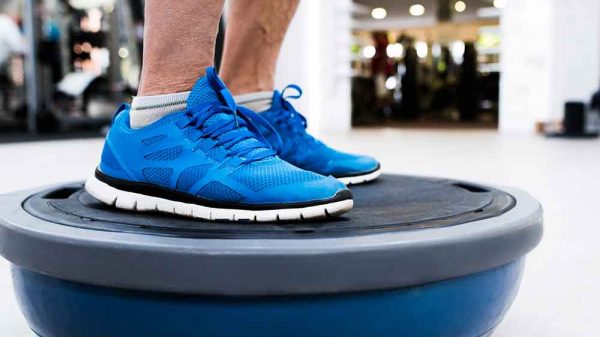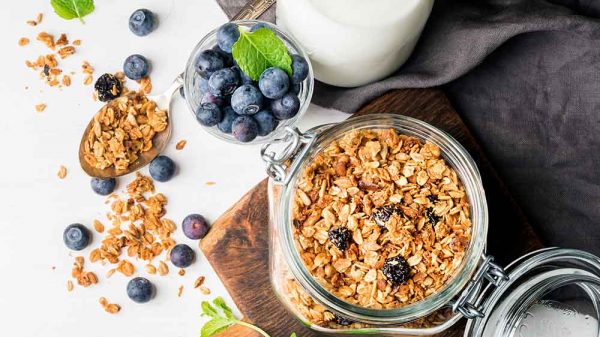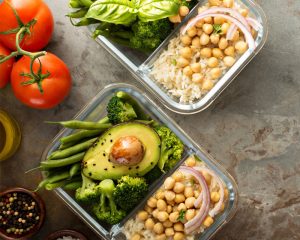Many people are turning to bariatric surgery to facilitate weight loss and manage obesity-related conditions like type 2 diabetes and fatty liver disease. Undergoing bariatric surgery often entails shrinking the size of the stomach, resulting in a significantly reduced capacity to eat large quantities of food. There are several types of bariatric surgery like gastric bypass surgery and gastric sleeve surgery (or sleeve gastrectomy).
Bariatric surgery is major surgery. It’s important that your body is in the best shape possible when heading into surgery. Following surgery, there are also dietary guidelines to follow to expedite healing time and help you achieve better health. Read on to find out more about the bariatric surgery diet pre op and post op.
Bariatric Surgery Diet Pre Op: Best Diet When Preparing for Surgery
So, you’ve been approved as a candidate for weight loss surgery. It can be relieving and exciting to find out you can receive effective treatment for obesity and metabolic diseases. You’ve entered another stage of your journey to health.
Before you can undergo the surgery, your physician will likely place you on a strict diet in the weeks prior to the surgery. The pre-surgery dietary guidelines will prepare your body for a smooth surgery, reduce the risk of complications, and ease the transition into your post-surgery lifestyle. Following a healthy diet before surgery also helps kick-start your weight loss and reverse an enlarged liver, contributing to a safer surgical procedure.
Here are a few of the dietary guidelines your physician may prescribe to prepare you for bariatric surgery.
Fruits and Veggies
Fruits and veggies are an important part of your diet when preparing for surgery. Fruits and vegetables are packed with vitamins, minerals, and antioxidants that support immune system function. Antioxidants help neutralize free radicals that inflict damage on cells and organs of the body. Reach for foods like spinach, broccoli, celery, apples, berries, green beans, and vegetable juice to get a healthy dose of vitamins and antioxidants.
Plenty of Lean Protein
Leading up to surgery, it’s vital to get optimal ratios of essential amino acids from protein. Essential amino acids offer the raw materials that the body uses to build muscle tissue and support immune system functions.
Animal products offer balanced ratios of essential amino acids. Egg whites, unsweetened Greek yogurt, low-fat cheese, and nonfat milk are good options. Lean meats like chicken breast and turkey breast are also low-fat sources of protein.
If you’re relying on plant-based sources of protein, be sure to combine several protein sources into your daily diet plan. A single vegetable protein source doesn’t offer ideal ratios of essential amino acids. Instead, enjoy a variety of vegetable proteins throughout the day, including nuts, seeds, beans, whole grains, and soy products.
High-protein meal replacement shakes and essential amino acid supplements are also excellent options for ensuring that you’re getting the amino acids that you need.
Cut Out Sugary Beverages
When following a liver-shrinking diet, steer clear of soft drinks, juices, and other drinks with added sugars. These drinks can contain five times as much sugar as your daily recommended amount. Consuming excess sugar can place extra strain on the body by worsening inflammation and contributing to fatty liver disease and type 2 diabetes. If you still need a bit of sweetness in your drinks, try crystal light to increase flavor without the added sugars.
Avoid White Bread and Pasta
Refined carbohydrates play the same role in the body as sugar. The body rapidly breaks down carbohydrates into glucose molecules that enter the bloodstream and cause a spike in blood sugar. Eating too many refined carbs has a similar effect on the body as eating too much added sugar.
Avoid Packaged Foods
Packaged foods tend to be filled with preservatives, added sugars, sodium, and unhealthy trans fats and saturated fats. Cutting these foods out of your diet leading up to surgery can help reduce inflammation and reduce strain on the body.
Avoid Fried Foods and Restaurant Foods
Fried foods are filled with trans fats that lead to weight gain, insulin resistance, and heart disease. In preparation for surgery, avoid eating out. Restaurants often use more unhealthy ingredients than you might think. A salad is usually topped with loads of cheese, creamy dressing, and croutons, and vegetables are cooked in lots of butter and salt.
Avoid Fatty Meats and Dairy
Processed and fatty meats and dairy include steaks, dark meat chicken, bacon, salami, and pepperoni. Steer clear of dairy products like full-fat milk, cheese, cream, and yogurt. These animal products are full of saturated fat that contributes to weight gain and heart disease.
High-Protein Diet and Caloric Restriction
In certain cases, your surgeon may require that you follow a low-carbohydrate, high-protein, low-calorie diet to facilitate rapid weight loss and help reverse an enlarged liver in preparation for surgery.
If your liver is too large heading into surgery, it can get in the way of the procedure as the surgeon is operating on your digestive system. Following a high-protein, low-carb, calorie-restricted diet leading up to surgery can effectively shrink the size of your liver.
Stay Hydrated
Staying hydrated is vital leading up to surgery. When the body is hydrated, all biological mechanisms can progress efficiently and flush out waste products. Plus, staying sufficiently hydrated keeps your blood circulation high, allowing nutrients and oxygen to reach all tissues and organs.
Bariatric Surgery Diet Post Op
Over the period of a couple of months, you will gradually incorporate solid foods into your diet as your digestive system returns to normal. In particular, the amount of food you’re eating is greatly restricted, which increases the likelihood of nutrient deficiencies. Here we’ve compiled all of the foods that support healing after weight loss surgery. All of these foods are relevant for any kind of bariatric surgery you’ve undergone, whether you’re following the gastric sleeve diet or gastric bypass diet.
Protein, Protein, Protein
Getting enough protein is a critical concern following bariatric surgery. Because your food intake is so low due to stomach size and you are restricted to liquid and soft foods for several weeks, it is extremely difficult to get adequate protein. Plus, during surgery recovery, your body needs more protein than usual.
The compounds that your body needs from protein are called amino acids. While your body can manufacture some amino acids, other amino acids must be obtained from dietary sources. These nutritionally required amino acids are called essential amino acids, and there are nine of them that we get from food: histidine, threonine, methionine, lysine, leucine, isoleucine, valine, phenylalanine, and tryptophan.
The body requires all nine essential amino acids to repair cells and tissues that have been injured in surgery. Not all protein sources contain all essential amino acids. Protein quality is often evaluated based on whether a protein contains all essential amino acids in optimal ratios. Animal products like meat and dairy, as well as soy protein, contain all essential amino acids and are generally regarded as high-quality protein sources.
When you are advised to follow a liquid diet, high-protein liquids include skim milk, soymilk, and pre-prepared protein drinks. Just make sure that all the drinks you use are low in fat and sugar.
When soft foods are introduced, try adding low-fat cottage cheese, Greek yogurt, and other soft low-fat dairy products to your post-op meal plan, which are high in protein and calcium. When consuming low-protein soft foods like applesauce, oatmeal, or sugar-free gelatin, adding essential amino acid powder is an excellent way to ensure that you’re getting easily digestible protein.
In particular, protein shakes are excellent options for obtaining all essential amino acids in optimal ratios. To add extra protein to your smoothie or shake, choose whey protein or essential amino acid supplements.
Try out these shakes for getting more protein into your post-surgery bariatric diet.
Strawberry Protein Shake
- 1 frozen banana, sliced
- 1 cup of low-sugar soymilk
- 1 scoop of vanilla protein powder
- ¼ cup of strawberries
Breakfast Shake with Coffee and Essential Amino Acids
This shake is the perfect substitute for a high-fat, sugary frozen coffee drink. Instead, fuel your body with energy, protein, and nutrients from coffee, essential amino acids, and banana.
- 1 frozen banana, sliced
- 1 serving of essential amino acid powder
- ¼ cup of cold brew coffee
- ½ cup of low-sugar soymilk
- 1 teaspoon of sugar-free cocoa powder
Brilliant Beet Booster
Beets are filled with natural nitrates and antioxidants that increase blood flow, lower blood pressure, and support faster healing. Plus, beets at a vibrant pink color to the smoothie that makes it extra appealing to drink.
- 1 beet, quartered and frozen
- 2 dates, pitted and chopped
- 1 scoop essential amino acid powder or vanilla protein powder
- ½ of a banana, frozen and sliced
- ¼ frozen cherries
- 1 cup of low-sugar soymilk
Fresh Fruits, Cooked Veggies, and Beans
When you can begin adding mashed foods to your diet, stick to cooked vegetables, beans, and blended fruits and avoid raw vegetables. Raw vegetables can contain compounds that are difficult to digest and are irritating for a healing digestive system.
Mashed black beans, kidney beans, white beans, and chickpeas are excellent options for getting fiber and protein as well as vitamins and minerals.
When eating pureed and mashed vegetables, make sure that the skin is removed. Sweet potato, green beans, squash, carrots, and other starchy vegetables are good options for pureed food. Steer clear of vegetables that are difficult to digest like broccoli and cauliflower.
Cooked, Grain-Based Cereals
Whole grains afford the complex carbs you need while also providing vitamins and minerals. Oatmeal, cream of buckwheat, cream of wheat, and grits are good options for a healing stomach.
Timeline and Tips for Eating After Bariatric Surgery
After you undergo bariatric surgery, your stomach and digestive system need to heal. Therefore, your physician will likely equip you with detailed guidelines and how much you should eat and how you should eat following your surgery.
Stages of Recovery
Generally, the recovery diet after surgery is split into four stages.
Stage 1: For the first 24 hours following surgery, you will only be able to drink water, to give your stomach a break and help with rehydration.
Stage 2: The next 24 hours following surgery, you will be limited to a clear liquid diet and noncarbonated beverages like chicken broth and dilute apple juice.
Stage 3: This part of recovery begins a few days after surgery and encompasses thick liquids and protein. During this stage, whey protein powder and essential amino acid supplements are vital to ensuring adequate protein intake. Thick soups are also great options.
Stage 4: After a couple of weeks following a diet of thick liquids, you can begin to introduce mashed and soft foods. Foods should generally be high in protein. When it comes to produce, stick mainly to cooked vegetables and blended fruits until your physician approves fresh fruits and veggies. If you have a sweet tooth, enjoy sugar-free gelatin or low-sugar jello.
Stage 5: Gradually add a variety of solid foods back into your diet.
Always follow your physician’s specific recommendations for when to begin to add soft and solid foods back into your diet, since each case will vary depending on your individual biochemistry and food sensitivities.
Introduce New Foods Slowly
When adding new foods to your diet, do so slowly and add one food at a time. When switching from liquid food to mashed foods, the transition should be gradual. When starting on mashed foods, still consume plenty of clear fluids and protein-rich liquids and supplement with mashed or pureed foods.
Keep Portion Sizes Small
Portion sizes will be drastically decreased in comparison to your pre-surgery diet. Each meal should only include about 6 tablespoons at most. If you feel full before you finish 6 tablespoons, that’s ok. It’s important to stop when you feel full so as not to risk complications like vomiting, dumping syndrome, and injury to the surgical site.
Avoid Carbonated Beverages and Alcohol
Carbonated beverages can be stomach irritants in the weeks following surgery. Steer clear of them until your surgeon clears you to add them back into your diet.
Eat Slowly and Deliberately
At all stages of recovery, it is critical to slowly eat your food. When you begin to add soft foods into your diet, make sure that you thoroughly chew all of your food so that it is already physically broken down when it enters your stomach. Each bite of food should be small. Following bariatric surgery, the stomach is very small and is unable to break down large particles of food or to process large quantities of food.
Space Out Your Meals
You should eat 5 very small meals throughout the day, leaving several hours in between each meal. It should take at least 30 minutes to an hour to eat your meal, to prevent your stomach from getting overly full and stretched, which could result in unpleasant symptoms like vomiting and dumping syndrome.
It is also advised to avoid eating and drinking at the same time. Be sure to consume your liquids approximately 30 minutes before your meal.
Eat Mindfully
Mindful eating is an extremely useful strategy for avoiding overeating and to make sure that you eat slowly.
In today’s busy world, we are all guilty of mindlessly eating. It’s too easy to polish off a bag of potato chips while sitting in front of the TV or to eat too many slices of pizza standing at the kitchen counter.
However, when you mindfully eat, you are aware of each bite you take and enjoy the present moment. By slowly and thoughtfully eating, you are allowing your body and mind to sense the feeling of fullness and respond accordingly. To practice mindful eating, take small bites, chew slowly, and think about the flavor and texture of all foods that you eat.
Follow Recommendations for Supplements
Physicians and nutritionists will likely prescribe dietary supplements after surgery, to make sure you’re getting all of the nutrients you need to support ideal health. After weight loss surgery, you are particularly susceptible to deficiencies in vitamin D, folate, B12, calcium, and protein.
Essential amino supplements are an easy and efficient way to get enough protein, because it spares the body excess effort in breaking down protein into individual essential amino acids. To round out your micronutrient intake, you will likely be instructed to add mineral supplements and a multivitamin to your dietary regimen.
Macronutrients: More Protein and Carbs, Less Fat
Following a diet that emphasizes protein and carbs is crucial for facilitating weight loss and promoting health immune function and muscle growth. Limiting fat intake is also important because your digestive system will likely be more sensitive to fat post-surgery. Plus, a diet low in fat ensures that you avoid harmful trans fats and saturated fats.
Your Long-Term Diet and Lifestyle
After bariatric surgery, your diet and lifestyle habits will undergo a significant shift that should endure for the rest of your life. You will have a new normal diet. Many of the preoperative dietary guidelines apply to your post-operative diet as well. Cutting out and maintaining small portion sizes is key to long-term success and sustained weight loss. In addition to facilitating weight loss, maintaining a healthy diet and lifestyle also allows your body to reverse metabolic conditions like insulin resistance, high blood pressure, and nonalcoholic fatty liver disease.
Exercise When Cleared
Pairing your healthy diet with exercise can make a huge difference for your weight loss journey and overall health. Research published in Diabetes, Obesity and Metabolism reveals that exercise and weight loss surgery is synergistic, producing even more positive health outcomes for weight loss and metabolic syndrome. (1)
Both aerobic exercise and strength training should be incorporated into your routine. Aerobic exercise strengthens your cardiovascular system and heart, and effectively lowers blood pressure. Strength training boosts muscle synthesis and raises baseline metabolic rate, leading to more efficient fat loss.
Always Consult Your Doctor and Dietitian
As always, each individual’s case is a bit different depending on biochemistry and any other underlying medical conditions. It’s important to always follow the guidance of your doctor and registered dietitian or nutritionist.
Conclusion
Following the proper diet before and after your surgery will ensure optimal results. Essential amino acids, vitamins, minerals are critical parts of the bariatric surgery diet. When combined with good post-surgery nutrition and lifestyle changes, weight loss surgery is a life-altering procedure that will lead to significant weight loss, improved metabolic conditions, and ultimately a higher quality of life.
